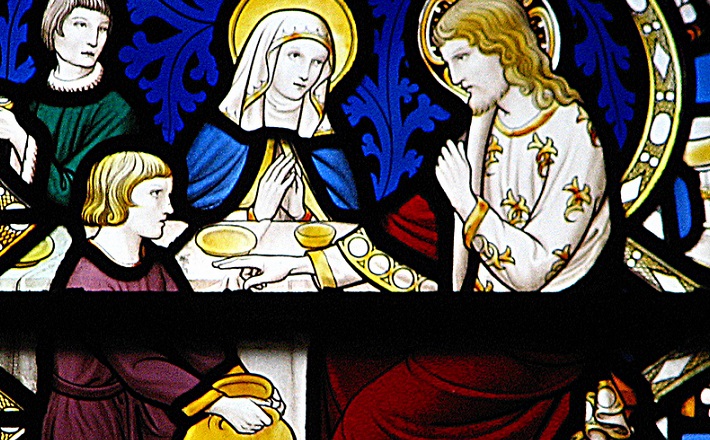Commentary on Isaiah 62:1-5
Isaiah 62:1-5 is part of that section of the book of Isaiah which is often termed “Third Isaiah” and placed historically in the postexilic period of Judah, although a more precise date within this period is difficult to determine.1
Some scholars read Isaiah 66:1 to mean that construction of the second temple has begun, but this verse is no more than suggestive and might simply indicate that people are making plans to rebuild, not that the process is truly underway.
What is clear from reading Third Isaiah is that the effects of the Babylonian destruction of Jerusalem are still felt very keenly. The key symbols of Zion theology, the presence of temple and the continued reign of the Davidide king — along with the sense of safety provided by the walls of the city — provided physical as well as symbolic sources of security. Now, although their reconstruction may have started, the symbols are still in ruins. This is the reality with which the prophet is grappling in Isaiah 62: the loss of self-rule and the continued absence of physical and symbolic stability, which suggests that God is absent as well.
Significantly, the prophet’s response to this reality is not to provide a word from God to the people. The prophet’s words are on behalf of Zion and are directed, albeit implicitly, to God (verses 1-4, 5b) and the people (see verse 5a, in which the word translated “builder” actually reads “builders” or “sons” in the Hebrew, suggesting that the human inhabitants of Zion are in view here). The prophet in these five verses stands in stubborn solidarity with Zion, refusing to budge until she is vindicated. In wonderfully onomatopoetic and alliterative Hebrew, the prophet uses two verbs with the “sh” sound which are translated as “rest” and “be silent” by the NRSV. The prophet will not hush or be shushed until Zion is transformed into a beloved and beautiful reality once again.
Through the rich imagery of the poem, ruined Zion begins to live again as the prophet speaks of this sacred place/idea using feminine pronouns and then speaks directly to the sacred place using the second person, “you.” Zion takes on human form and personality through the prophet’s use of personification, a poetic device whereby an abstraction or a non-human object is given human qualities. By referring to Zion as “you” — “The nations shall see your vindication, and all the kings your glory, and you shall be called by a new name…” (62:2) — the prophet appeals to the imagination of the reader to see beyond the rubble to the powerful reality that a human figure represents.
The expression, “Where there’s breath, there’s hope,” certainly applies here. By giving Zion breath and personality, speaking as if she were a human being, the prophet suggests to the people that it is not yet time to give up on Zion. There is still reason to hope. She is not dead yet.
She is alone, however, and it is this state that the prophet intends to rectify, calling her “Forsaken” and “Desolate” in the first part of verse 4 but promising that these names will no longer be appropriate in the future. Her current isolation and abandonment will have an end. The prophet’s vision of the future is profoundly intimate, an appropriate antidote to her current existence. Forsaken no more, she will be called Hepzibah, “My Delight is in her,” the prophet writes, and the name underscores the delight and the deep connection between Zion and her God.
“Desolate” is changed to Beulah (“Married”), a name change that also signifies connection and love. I am reminded of the novel Silas Marner, by George Eliot, in which the reclusive Silas Marner takes in an abandoned girl-child and names her Hepzibah. The name proves to be prophetic in the novel, for both individuals are alone in the world at this point and both find joy and strength in their new family of two. Intimacy trumps despair. Alienation and abandonment are replaced by unity and joy.
I think that it is essential in preaching this text to communicate just how necessary it is for Christians to play the role the prophet plays here. The experience of divine abandonment is devastating both for communities and individuals. Just as Zion seemed a sacred place forsaken by the sacred presence, many human beings feel cut off from the love of God, cast off by the divine. In Isaiah 62:1, the prophet promises not to stop talking until Zion is filled with the presence of God once again. In the same way, Christians are called to be just as stubborn in their refusal to allow isolation and hopelessness to have the last word in people’s lives. The solution to darkness and despondency is connection and companionship, a willingness to love and to serve each other.
The creative power of human connection cannot be overstated just as the destructive power of isolation cannot be underestimated. Ai Weiwei is a Chinese artist and dissident, who speaks out against the human rights abuses in his homeland. He was jailed in 2011 by the Chinese authorities and charged with tax evasion, a charge of which he was most certainly innocent. In response to the charge, a number of people sent money to help him pay the taxes the government said he owed.
Ai Weiwei wrote of these people, “There were thousand of moving messages. People sent money from their first month’s salary. Others said: This is my retirement payment — take it. This is the money for my next pair of shoes — take it. It was very important for me to see and hear those things. Normally you do not see the warmth, humor, care and generosity of the people while writing a blog. You just feel like you are walking in a dark tunnel and you feel alone.”2
Humor, warmth, care, and generosity are the antidotes to isolation and despair. They are the enemy of oppressive regimes and abusive relationships. They are the presence of God shining through Christians in the darkest places.
1 This commentary originally published on this site Jan. 20, 2013.
2Ai Weiwei, Weiwei-isms, edited by Larry Warsh (Princeton: Princeton University Press, 2013), 101.


January 17, 2016